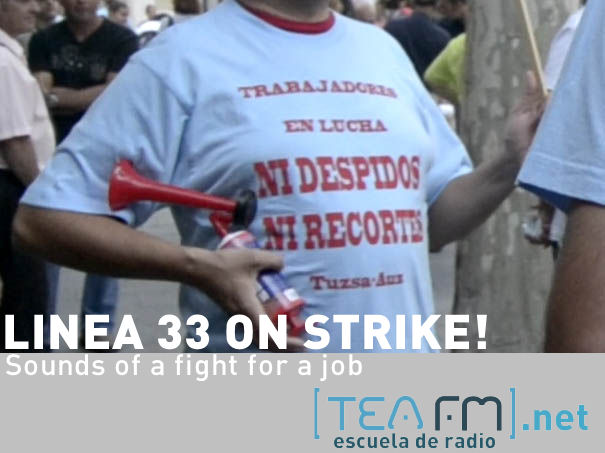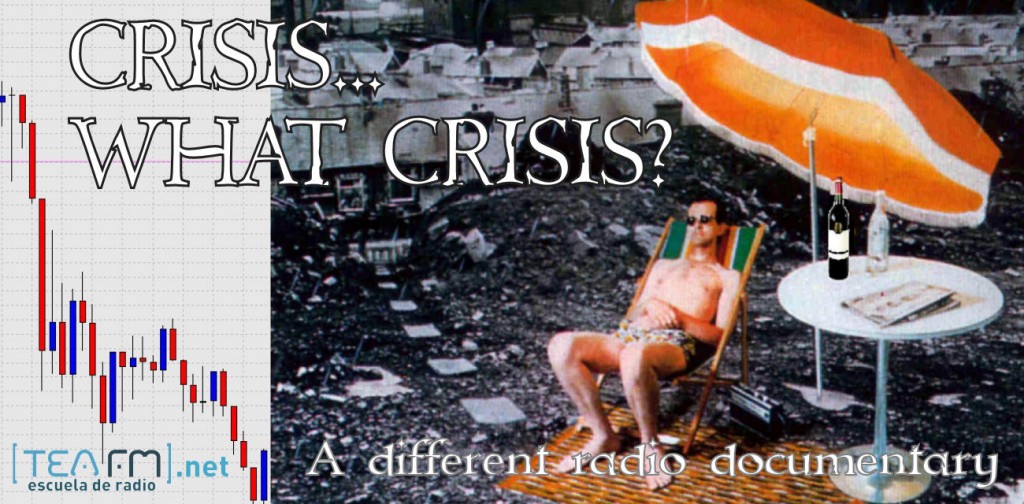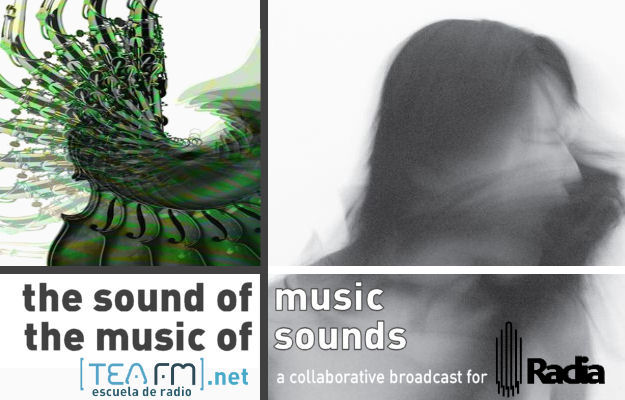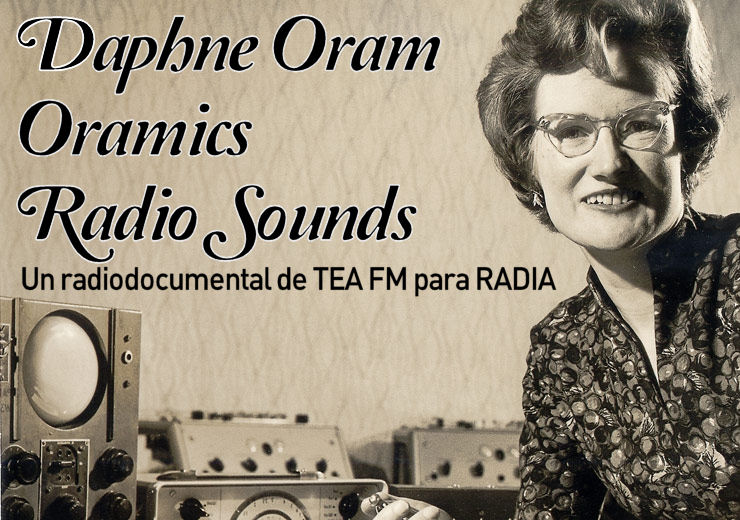El paisaje sonoro es la parte olvidada del entorno.
La imagen nubla y desvirtua en muchas ocasiones la verdadera esencia de lo que nos rodea.
El sonido nos permite descubrir los pequeños detalles.
En este trabajo, realizado a través de Francia durante los años 2012 y 2013, Chuse Fernandez nos muestra un paseo sonoro por diversos lugares de Francia, permitiendo al oyente descubrir espacios acústicos que están ahí, aunque en muchas ocasiones no los veamos.
::::::::::::::::::::::::::::::::::::::::::::::
L’ambiance sonore est la partie oubliée de l’environnement.
L’image s’estompe et souvent nuit à l’essence même de ce qui nous entoure.
Le son nous permet de découvrir les petits détails.
Dans ce travail, mené par la France dans les années 2012 et 2013, Chuse Fernandez nous montre un son promenade à travers diverses parties de la France, ce qui permet à l’auditeur de découvrir des espaces acoustiques qui sont là, mais souvent nous ne voyons pas.
::::::::::::::::::::::::::::::::::::::::::::::
The soundscape is the forgotten part of the environment.
The image blurs and often detracts from the true essence of what surrounds us.
The sound allows us to discover the small details.
In this work, carried out by France in the years 2012 and 2013, Chuse Fernandez shows us a sound walk through various parts of France, allowing the listener to discover acoustic spaces that are there, but often we cannot see.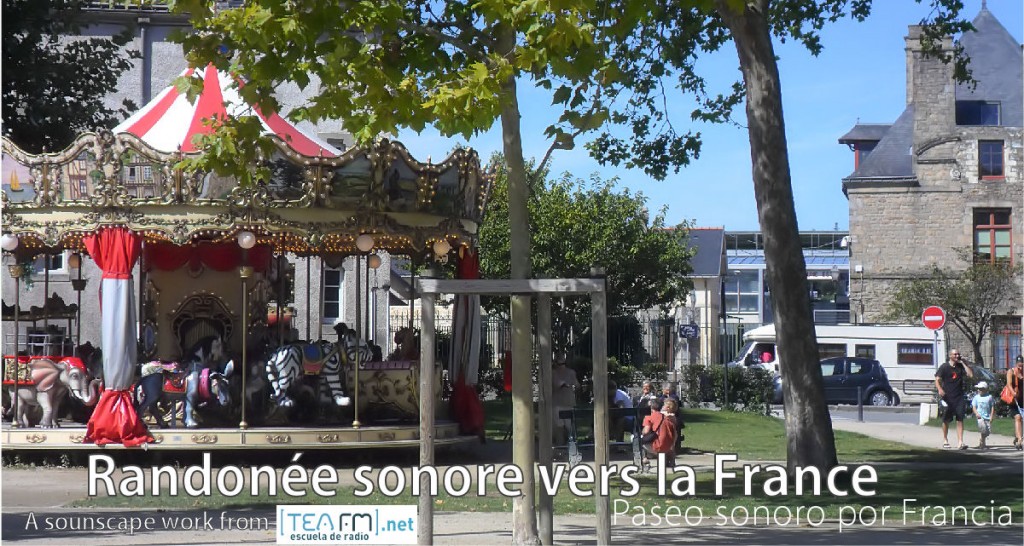
All posts by teafm989
Show 451: Radia Línea 33. On strike for a job. (TEA FM)
153 conductores despedidos en los Autobuses Urbanos de Zaragoza y 223 de la empresa que los carrozaba, son las consecuencias de la concesión del transporte urbano por parte del ayuntamiento de esta ciudad a la empresa mexicana A.D.O.
Más de 45 días de Huelga están haciendo la movilidad en la capital del Ebro algo realmente problemático, aun así la solidaridad entre huelguistas y usuarios se respira día a día!!
Recogemos en esta ocasión los sonidos de la protesta, sus explosiones sus cánticos, sus reivindicaciones. No hay palabras solo sonidos y ambientes. Sin decir nada, se entiende todo.
Programa especial de Linea 33 para RADIA. Un espacio de TEA FM dirigido por Santi Ric, donde descubrimos opiniones de dentro y de fuera de los medios de transportes públicos. Debates, ideas, comentarios de los que trabajan, sufren y disfrutan de buses, taxis, metros….o simplemente situaciones que transcurren en esos espacios…
Con una cuidada selección musical, en la que las letras se convierten en contenidos.
Un programa construido con audios capturados por Santi Ric.
Hasta la victoria siempre… y más allá!!!
www.teafm.net
Podcast LINEA 33
Dismissed 153 city buses drivers and 223 of the company that set up them, are the consequences of the urban transport grant by the municipality of the city of Zaragoza to the Mexican company ADO.
Over 45 days of strike are making Ebro capital mobility in something really problematic, yet the solidarity between strikers and users daily breathe!
We have collected the sounds of the protest, their bangs, their songs, their claims. No words, just sounds and environments. Without saying anything, we can understand everything.
A “Línea 33” special program for RADIA. A TEA FM broadcast conducted by Santi Ric, where we can discover views from inside and outside of the public transportation.
Discussions, ideas, comments of those who work, suffer and enjoy buses, taxis, subway….
Or just situations that occur in these spaces…
With a careful music selection, in which the lyrics become content.
A radio broadcast built with audios captured by Santi Ric.
Always fighting for the victory … and beyond !
Show 427: Crisis, what Crisis? (TEA FM)
Crisis
f. Mutación considerable en una enfermedad tras la cual se produce un empeoramiento o una mejoría: “El enfermo ha conseguido superar la crisis.”
Problema, conflicto, situación delicada: “Esa pareja está pasando por una crisis.”
Cambio importante en el desarrollo de un proceso que da lugar a una inestabilidad: “Crisis económica.”
Estamos en crisis, si. ¿Pero, en qué crisis? ¿Crisis financiera? ¿Crisis moral? ¿De valores? ¿Existencial? ¿Somos conscientes de ella?
Demasiadas preguntas que son una sola. Y respuestas en el aire, en la cabeza de todos y en las manos de muy pocos.
Este documental radiofónico intenta reflejar esta crisis planteando una serie de preguntas con respuesta. La que cada uno podamos darle.
Un trabajo compuesto por audios de Chuse Fernández, Fulvio d’Orazio, Juanjo Palacios, Miss Jenny Tails y Paco Rossique y la voz de Leonor Bruna en los textos en lengua alemana de Bertolt Brecht, Erich Kästner y un poema anónimo junto a recortes sonoros de informativos de la BBC, NBC y La Sexta TV.
Una producción de Chusé Fernández para TEA FM.
:::::::::::::::::::::::::::::::::::::::::::::::::::::::::::::::::
CRISIS, WHAT CRISIS?
Cri • sis
[krahy-sis] noun, plural cri•ses [-seez], adjective
Noun
1. A stage in a sequence of events at which the trend of all future events, especially for better or for worse, is determined; turning point.
2. A condition of instability or danger, as in social, economic, political, or international affairs, leading to a decisive change.
3. A dramatic emotional or circumstantial upheaval in a person’s life.
4. Medicine/Medical .
a.The point in the course of a serious disease at which a decisive change occurs, leading either to recovery or to death.
b. The change itself.
5. The point in a play or story at which hostile elements are most tensely opposed to each other.
We are in crisis, yes. But, what crisis? Financial Crisis? Moral Crisis? Crisis of values? Existential? Are we aware of it?
Too many questions that are one. And answers in the air, everyone’s head and into the hands of very few.
This radio documentary attempts to reflect this crisis posing a series of questions to answer which each can give. A work consisting of sounds from Chuse Fernandez, Fulvio d’Orazio, Juanjo Palacios, Miss Jenny Tails and Paco Rossique and Leonor Bruna’s voice in German texts by Bertolt Brecht, Erich Kästner and an anonymous poem with info cuts from BBC news, NBC and La Sexta TV.
Show 404: TEAFM. The time sound machine
La memoria histórica de la raza humana se basa en registros. Las pinturas rupestres, los altorrelieves etruscos, los mosaicos romanos, las primeras imprentas… todos esos registros eran visuales, tangibles.
Diez instantes de la Historia Humana en los que se refleja la importancia del sonido y de los elementos que refuerzan su poder de comunicación.
Pero del mismo modo que la percepción de una obra pictórica cambia dependiendo del entorno donde se observa, de la luz, de los factores externos a él, el mensaje que transmite un sonido varía dependiendo de las interferencias que lo acompañan.
Fijémonos más en esos acompañantes que en el propio mensaje.
Quedaremos sorprendidos de lo que podemos escuchar si prestamos la suficiente atención.
No es hasta la segunda mitad del siglo XIX cuando se realizan los primeros registros sonoros. Édouard-Léon Scott de Martinville patenta en 1857 el Fonoautógrafo, considerado el primer aparato capaz de registrar sonido en un medio visible.
En este radiodocumental escucharemos la primera grabación conocida que ha llegado hasta nosotros es de 1860; Au Clair de la Lune.
Pero también los primeros registros sonoros del grafófono, la primera llamada telefónica intercontinental, capturas sonoras de voces nacidas antes de 1800…
Un viaje subidos a nuestra máquina del tiempo para recorrer los registros sonoros que han marcado los últimos doscientos años de nuestra Historia.
Una producción de la Escuela Creativa de Radio TEA FM para RADIA.
www.teafm.net | info@teafm.net
ENGLISH VERSION :::::::::::::::::::::::::::::::::::::::::::::::::::::::::::::::::::::::::::::::::::::
The historical memory of human race is based on records. The cave paintings, Etruscan reliefs, Roman mosaics, the first printing … All these records were visual, touchables.
This program collects ten moments of human history which reflects the importance of sound and elements that reinforce its communication power.
But just as the perception of a painting environment changes depending on where it is observed, in the light of external factors to it, the message conveyed sound varies accompanying interference.
Let’s look at these companions more than the message itself.
We’ll be surprised what we can hear if we pay enough attention.
It is not until the second half of the nineteenth century when the first sound recording is made. Édouard-Léon Scott de Martinville patented in 1857 the phonautograph, considered the first device capable of recording sound in a visible support.
In this radiodocumental we can hear the first known recording that has come down to us is 1860, Au Clair de la Lune.
But the first sound recordings of graphophone, the first intercontinental phone call, sound captures from voices born before 1800 …
A trip uploaded to our time machine to travel the sound recordings that have marked the last two hundred years of our history.
A TEA FM Radio Workshop broadcast for RADIA
www.teafm.net | info@teafm.net

Show 380: Sounds of music by TEA FM
SOUNDS_OF_MUSIC_THE_MUSIC_OF_SOUND
What produces the music sounds?
What sounds are music to us?
In the next few minutes we will hear noises, voices, music …
All occurred as a result of musical creation, manufacture of instruments, vocal exercise.
We entered at the rehearsal room, the workshop of sounds coming out the pieces to be assembled in the assembly that is your head.
We talk with a luthier, maker and repairer of sounds. He tells us what it does and its noises betray him.
We went on tiptoe for the trial of a band of rock and roll and thus discover the sounds of music of the twentieth century.
Then, we will open the door of a composer of electronic music to listen and develop his work, the sound like his tools, which produce noise keyboards, synthesizers, computers …
Finally, we found that the sounds of music are intrinsically linked to the music itself.
Without these noises, music is not serious music.
Listen … and make noise.
Produced by Radio Creative School TEA FM.
Script and production sharing between Laura Romero, Daniel Canelo, Miguel Deza and Chuse Fernandez.
Postproduction by Chuse Fernandez.
Show 358: Oramic Radio Sounds by TEA FM
The School of Creative Radio TEA FM from Zaragoza has developed a new radio documentary based on the works and sounds made by Daphne Oram (Dec 31th 1923 – Jan 5th 2003) British composer and electronic musician. She was the creator of the “Oramics” technique for creating electronic sounds.
Developed in documentary form, we will cross the sounds created by her “Oramics Machine” and we will talk with people close to her and her work.
In 1959 she installed her Oramics Studios for Electronic Composition in Tower Folly, a converted oast house at Fairseat, near Wrotham, Kent. Her output from the studio, mostly commercial, covered a far wider range than the Radiophonic Workshop, providing background music for not only radio and television but also theatre and short commercial films. She was also commissioned to provide sounds for installations and exhibitions. Other work from this studio included electronic sounds for Jack Clayton’s 1961 horror film The Innocents, concert works including Four Aspects and collaborations with opera composer Thea Musgrave and Ivor Walsworth.
With the voice and talent of:
Isabel Aparicio, Daniel Canelo, Mar Gonzalez, Manuel Alcaine, Miguel Deza, Reyes Casasnovas and Carlos Berdiel
Music & FX:
Daphne Oram, TEA FM FX gallery, BBC and MEC Sound Archive
Script and production:
Chuse Fernandez
A TEA FM production. Recorded on TEA FM-CTA Studios on January 2012.
Show 338: NIKOLA TESLA: Tribute to an outlaw of science
Now, the School of Creative Radio TEA FM from Zaragoza has developed a radio documentary based on the life and work of Nikola Tesla, who recovered a sound of his voice testimony.
Developed in documentary format and a small piece of radiotheatre, we launched into the air several questions regarding the development of technologies that Tesla launched almost 100 years ago, and his relationship with Edison.
We also let the air in the ratio of large companies and the energy business in front of the universal spirit of Nikola Tesla and his claim, denied by many, to create free energy and free for everyone.
The music that accompanies this production is original and written especially for this program by Daniel Canelo
(http://thehappymarvinproject.bandcamp.com/)
:::::::::::::::::::::::::::::::::::::::::::::::::::::::::::::::::::::::
En esta ocasión, la Escuela Creativa de Radio TEA FM desde Zaragoza ha preparado un radio-documental basado en la vida y obra de Nikola Tesla, de quien recuperamos un testimonio sonoro de su voz.
Desarrollado en formato documental y con una pequeña pieza de radioteatro, lanzamos al aire varias preguntas respecto al desarrollo de las tecnologías que Tesla puso en marcha hace casi 100 años, y la relación de este con Edison.
También dejamos en el aire la relación de las grandes compañías y el negocio de la energía frente al espíritu universal de Nikola Tesla y su pretensión, por muchos negada, de crear energía libre y gratuita para todo el mundo.
La música que acompaña esta producción es original y compuesta especialmente para este programa por Daniel Canelo (http://thehappymarvinproject.bandcamp.com/)

